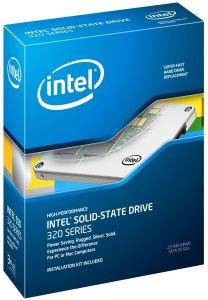 Intel has announced its third generation of Solid-State Drives (SSD), the 320 Series, which double the capacity of last years models to 600GB. Still, for many models, prices have dropped as much as 20 percent from last year, despite the increases in capacity (consumer prices may vary). It seems that Moore’s Law can’t be beat. The 320 series will replace Intel’s current X25-M SSDs and utilize the new 25nm NAND Flash memory process that Intel unveiled last year. The new drives are intended for laptop and desktop computers.
Intel has announced its third generation of Solid-State Drives (SSD), the 320 Series, which double the capacity of last years models to 600GB. Still, for many models, prices have dropped as much as 20 percent from last year, despite the increases in capacity (consumer prices may vary). It seems that Moore’s Law can’t be beat. The 320 series will replace Intel’s current X25-M SSDs and utilize the new 25nm NAND Flash memory process that Intel unveiled last year. The new drives are intended for laptop and desktop computers.
Intel promises better data security (128-bit encryption), power-loss management, and new data redundancy features. The new drives come in the following sizes and prices. All drives come with a 3 year warranty.
- $89 – 40GB
- $159 – 80GB
- $209 – 120GB
- $289 – 160GB
- $529 – 300GB
- $1,069 – 600GB
While still expensive, SSD prices are dropping quickly and capacity is rising faster still. SSD drives offer much faster boot times and data access speeds than traditional spinning hard drives.
TechTree linked to a great Intel video in its report. Check it out below. For more detailed information on Intel’s new drives, head to its product page.


